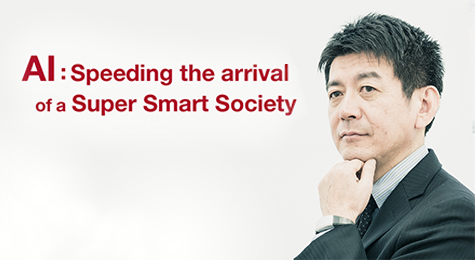
"We know only two things about the future: It cannot be known, and it will be different from what exists now and from what we expect."
── Peter Drucker *1
What's the best way to handle this unpredictability? This is one of the many challenges businesses face today, and the difficulty keeps growing.
In the past, businesses would classify situations into categories and handle unpredictable circumstances by considering contingencies in advance for each category. However, fluctuations in demand and prices as well as diversification of individual preferences are just happening at an increasingly rapid pace. As business activity crosses borders, businesses also face differences in national and regional cultures and customs. Attempting to accurately classify all of these would result in an overwhelming number of categories. And because envisioning all kinds of situations in advance is theoretically impossible, a business would need to constantly update its classifications and approaches, requiring a great deal of effort and cost.

The way to change this state of affairs is through AI (artificial intelligence). There are already several types of AI being used today, but each of these is merely limited to a specific application.
For example, there's the AI that generates customer recommendations for retailers. There are facial recognition systems that spot faces from photo data. There are systems that answer quizzes. Technologies that identify people's faces based on online images. These types of AI must be designed by humans based on hypotheses of data that people would enter, implemented as programs, and analyzed and developed for each problem to which they are applied. And one disadvantage of being based on hypotheses envisioned by people is that they usually do not produce results that surpass human ideas.
One technology that has realized a greater level of versatility is Hitachi AI Technology/H (hereafter "H"), which was announced by Hitachi in 2015. H responds to a wide range of applications, automatically generating a large number of hypotheses -- over one million -- from the data itself and then deriving the factors to be required and selecting the best of the options given by humans.
Here is one experiment. A robot outfitted with H is placed on a swing made of toy blocks. With the purpose of "maximizing the deflection angle of the swing," it is given a condition of "bending and extending the knees." H forms hypotheses on when and how much to bend the knees based on information obtained through its own movements. It acts on these and begins to search for the optimum values. The robot with H started to move the swing in less than one minute, and in five minutes came up with a swinging motion beyond even human conception.
In examples like these, H can learn from voluminous amounts of data and make judgments on its own, eliminating the need for people to set up hypotheses in advance and finding solutions that humans had not conceived.

H can be applied to existing systems in various fields and issues, without the need for altering basic functions. When used as an add-on, it can learn on its own to turn existing systems into growing systems.
For example, one distribution warehouse used H as an add-on to its WMS (Warehouse Management System), and as a result achieved an 8% improvement in productivity at that warehouse. Other improvements that have been confirmed include 15% better sales at a store and a 27% boost in order rates at a call center. It's also being applied in finance, railways, factories, water plants, and other areas -- already 57 projects in 14 areas.
Next, it's your turn. H is your partner for handling the unpredictability of modern business.




AI is a mechanism for creating diversity

AI Analytics
FinTech is transforming the financial services industry today, with completely new services already appearing worldwide.

Artificial Intelligence as a Hope
AI for Taking the Challenges of Unpredictable Era